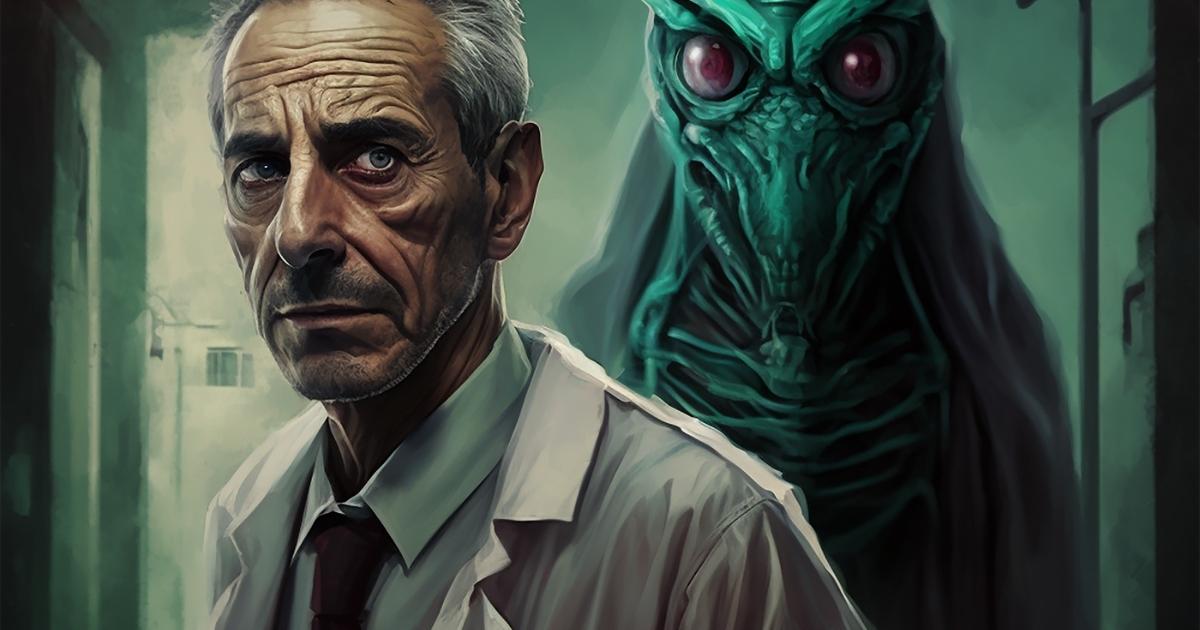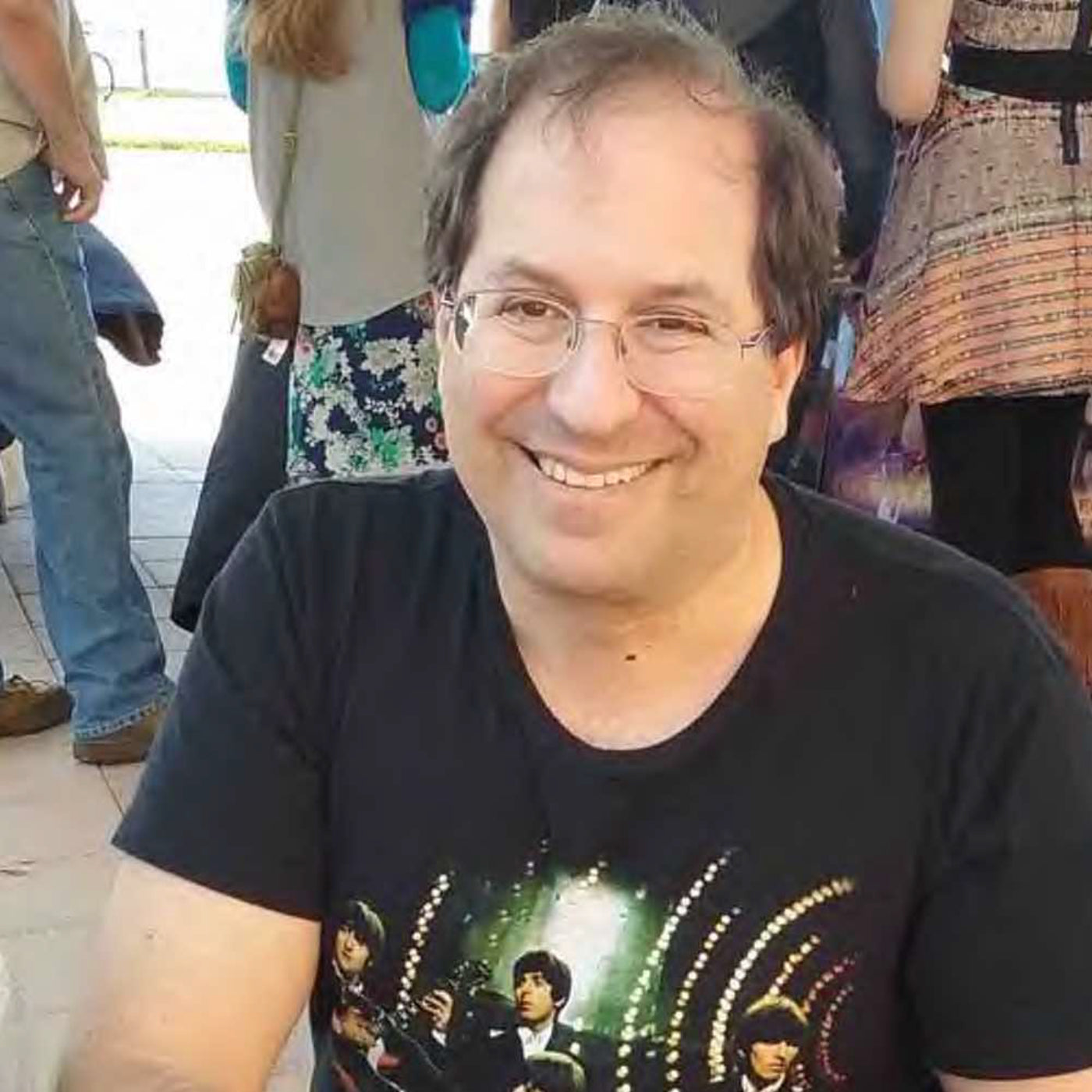

Side Effects
By Allan Dyen-Shapiro
He’s one of them. Sure, the version of Yakov Cohen who sits beside my bed in this clinic on Jerusalem’s outskirts almost passes for my husband of seven years, but I know he’s an alien in disguise.
Alien Yakov leans out of the overstuffed chair and clasps the part of my hand that sticks out from the restraint. “Honey, what’s going on in your mind is a side effect of the drug. The doctors at the clinic aren’t from outer space. They work for the American company that makes the medicine. Think about it—why would you be the only person on the planet to retain her memories?”
Why? Because an alien surgeon clawed into my brain and implanted a delay device so they could keep me around long enough to study. Where other humans have only the femtoseconds an electron uses to switch spins to sample any particular reality in the multiverse, I get a day. Sometimes even a week. My undergraduate physics classes at Bar Ilan taught me to predict probabilities of quantum state switching under normal circumstances, but I don’t have a clue how long I’ll be talking to the current version of Yakov. I don’t understand the technology. Nor have I divined what the aliens wish to learn or why they chose me for their experimental subject.
Three changes ago, I learned to recognize the controller they use to force a state shift. It emits infrared light, and although most humans cannot see in this range, I can. The aliens don’t realize. If I find and steal the controller, I can escape.
So, I buy time by humoring alien Yakov. “I guess. But you’re sure you don’t want to speak with a lawyer?” I shift onto my side to face him, and I take stock of the room, beginning with the artwork: two paintings. The first, a desert scene rendered in watercolor, hangs on the wall opposite the bed. The second, an abstract oil painting, mostly black but streaked with bright white, abuts the door. Otherwise, the room is standard for a Kupat Holim clinic: guest chairs, TV, a window with drab curtains. The floor smells of antiseptic. The restraints itch, as does skin where an IV enters the vein of my right arm.
“The company will take care of us,” alien Yakov says.
Sure. Like my HMO took care of me when they required this drug rather than an expensive surgery to treat pancreatic cancer. Yakov 1.0 would have been on the phone, contacting other victims, preparing to file a class action suit. The pharma company the aliens use as a front is incorporated in Delaware. We could sue them in American courts and force them into the open.
But today’s Yakov isn’t the man I married. The chief alien, who presents in most versions of the multiverse as feline with bristly whiskers and silver-patched tabby coat, lured my real husband and me to this “clinic,” telling us my cancer medication had caused symptoms of schizophrenia. By the time I saw through the deception, the “doctors” had strapped me to a gurney and wheeled me far from where they must have led Yakov. I couldn’t warn him.
Schrödinger’s cat food is what I call the aliens’ victims.
A knock on the door interrupts my reveries. Doctor Katz—gee, you’d think the alien leader wouldn’t have been so obvious with the name he picked for his badge—strolls in, surrounded by a coterie of three fresh young faces with clipboards. A swarthy, bearded gentleman who sports a patterned tie underneath a white lab coat trails behind.
The esteemed doctor speaks first. “Good morning, Ronit. How are you feeling today?”
I feel like I prefer you as a cat. In Jerusalem, we don’t think twice when a speeding car smashes into one and the next vehicles grind it into the pavement. The British introduced cats to deal with a rat problem. Ever since, they’ve been the city’s primary vermin. “Who are the minions?”
“May I introduce Doctor ibn Khalid, Cancer Solutions’ specialist on issues relating to chemotherapy products in Israel.”
The aliens apparently weren’t all that careful in constructing their ruse. An American company wouldn’t have an Arab assigned to Israel.
Katz realizes his slip and tries to recover. “His territory also includes Judea and Samaria.”
The others must be medical residents, observing. Inferior status—were they alien slave labor? I address the important visitors. “Not in Gaza, too?”
“Nobody there can afford our products,” ibn Khalid says.
Typical. Give an Arab half a chance and a few bucks, and he’ll sell out his own people, no problem. The aliens at least got that right. As he’s really a cat…well…let’s just say they’re filth-dwelling carnivores, so no inconsistencies there either. “So, are you going to kill me and then autopsy, or do you need me alive?”
“Death would be inconvenient. I require blood samples to analyze. The company is expecting reports.” Ibn Khalid grins. “I’m a doctor, first and foremost. Hippocratic Oath and all. Sure, anything we learn from you will help treat others with these side effects, but goal number one is returning you to health.”
I refuse to play along. “Torture, then? You’ve got me tied up. Your kind loves to have power over mine.” At least it will end soon. Whatever happens in this universe won’t carry over to the next. But for now, they are in control.
Ibn Khalid addresses my husband, not me. Arab men tend to do that (Israeli men aren’t much better); sexism from an alien impersonating one comes with the territory.
“Mister Cohen, don’t feel you need to apologize. I don’t let racism get in the way of doing my job. My kind is a doctor. And with Ronit’s hallucinations, I’m not holding anything your wife says against her.” He turns his head and makes eye contact with me but continues to speak with alien Yakov. “The medicine we gave her intravenously should take effect soon. It relieves the psychosis with most patients, but I’ve also seen it make things worse. I need to examine her.”
Ibn Khalid motions to the residents. Two hold me down by the shoulders, and the third removes one of the restraints.
“Ronit, I’m going to take your pulse.”
Initially, I offer no resistance, but as ibn Khalid places his hand on me, I notice a faint signal from within the pocket of his lab coat. Emboldened, I lunge forward. I grasp fabric and pull.
The controller, which in this reality resembles a cell phone, falls free onto the blanket. The infrared blinds me, but before the aliens can react, I press a button. A flash erases the room.
My bare feet press against roughness. They are free, as are my arms, but I am still clad in a hospital gown. Tentatively, I step. The substratum shifts beneath my feet—it is warm but not hot. In the sky, indigo and purple recall a sun recently set over dunes and mountains. Closer, a line of camels led by Bedouin men in their white ankle-length garments ambles across my path. Am I in the Negev? The Sinai?
A dry breeze rustles my garment and stirs sand cyclones. The caravan pauses, and above the rush of wind and the braying of camels—a strangled sound like a man’s hoarse scream—I hear Arabic conversations, but they are too indistinct to discern words or meaning.
The desert honor code, the diyafa, mandates protection of strangers. Alone, with no food or water, and unsure how long the present scene will persist, I walk toward them. What choice do I have? I trust, not out of instinct, but instead from necessity. We share the same reality.
One man hands his camel’s rope to another. He advances, one arm extended. When he is near, I see what he holds: a goatskin. My throat is dry, my lips desirous of the water. Perhaps he too is human.
I reach out, but before I accept his gift, I lock eyes, not with the man, but with the camel behind him. They glow infrared. It was a trap.
A white fire consumes the desert. When my face begins to melt, I screw my eyelids shut. A harsh buzz grows louder. I reopen my eyes, and all is gooey tar and smells of sulfur. The men are gone, but an onyx mound stands where each camel had been.
They quiver; they undulate. I am strapped down as in the earlier universe, unable to flee. My skin burns.
The blacknesses approach and extend appendages, each terminating in a paw. Razor-sharp claws glisten under fluorescent lighting.
They purr.
Copyright © 2023 Allan Dyen-Shapiro
The Author

Allan Dyen-Shapiro


